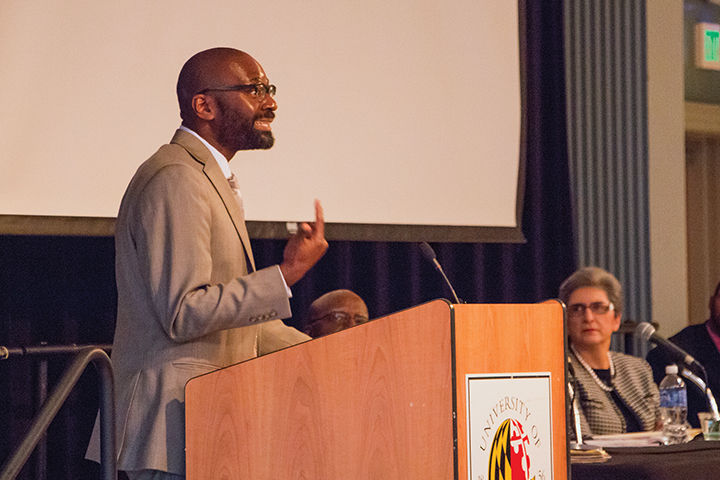
John L. Jackson Jr., a Dean of the University of Pennsylvania’s School of Social Policy and Practice, speaks at the Structural Racism and the Root Causes of Prejudice Series event in the Stamp Colony Ballroom on Wednesday, October 29.
Even on a campus as diverse as this university’s, race is not something that’s often discussed.
But racism is present in every society, and is therefore present on this campus, said Hoda Mahmoudi, a professor and chairwoman of the university’s Baha’i Chair for World Peace program.
And the only way to confront or change it is to have a discussion about it, she said.
That opportunity for conversation came to the campus yesterday afternoon when about 100 students, visitors and staff gathered in Stamp Student Union’s Colony Ballroom to hear scholars discuss structural racism and the root causes of prejudice at the Baha’i Chair’s fall symposium.
“Racism is considered one of the major barriers creating a condition that really cannot be conducive to building a better society,” Mahmoudi said to the crowd. “It’s one of the impediments to a more peaceful world, and therefore to understand more about how to apply scholarship … about this important issue is extremely important to all of us.
The symposium featured Phillip Bowman, professor and founding director of the National Center for Institutional Diversity at the University of Michigan, and John L. Jackson Jr., a professor and dean of the School of Social Policy and Practice at the University of Pennsylvania.
“The Bahai Chair seeks to bring scholars who are working at the forefront of their field and bring about scientific bases for knowledge that can shed light on these issues that we’re trying to understand better,” said Nadim van de Fliert, the Baha’i Chair’s endowment planning officer.
Bowman talked about contemporary racism, organizational inequality and sustainable diversity, connecting the issue and challenges of racism in present day with how different types of racism have evolved.
Jackson’s discussion brought the topic closer to the audience’s emotions, in a talk he labeled “What you can’t see is what you get.” Jackson highlighted issues in post-racial America, and said people have to listen to one another without jumping to conclusions or getting offended.
“What I’m hoping is that we can produce spaces where people can speak honestly,” Jackson said. “You can listen to anyone and get cultural insight.”
Freshman Joyce Yang said a conversation like this could be useful in the way people treat each other.
“I just came because I thought it would be interesting to hear a perspective about race and learn more about prejudice and racism in general,” said Yang, who is enrolled in letters and sciences. “But I loved how passionate they were about it, and they brought up a lot of controversial issues.”
Yang also said the symposium made her think about how she views herself and other races.
“I do see racism, and they brought up a lot of things that make me question things I think myself,” she said.
Onyekachukwu Uche, a freshman computer science major, said he went to the symposium for his African-American studies class. But he ended up relating to much of what was discussed, he said, especially with regard to what he’s learning in class.
Uche said, from his perspective, it seems like a lot of isolated events focus on who is to blame for making assumptions, and because of that, people do not completely understand the way racism and social constructs work. This can change if society learns to look at racism from different viewpoints and stops degrading one another, he said.
“The school is so diverse,” Uche said. “A lot of students showed up, and it’s important that they do. It gives them some insight into what’s happening.”
This symposium brought a global perspective to racism, while using the scholars’ extensive research to support it, Mahmoudi said. It was a learning experience for anyone who attended, and will inspire other conversations to stem from this one, she added.
“If the whole society doesn’t approach prosperity, ultimately everyone suffers,” Mahmoudi said. “We have to address the key issues that seem to be problems.”



